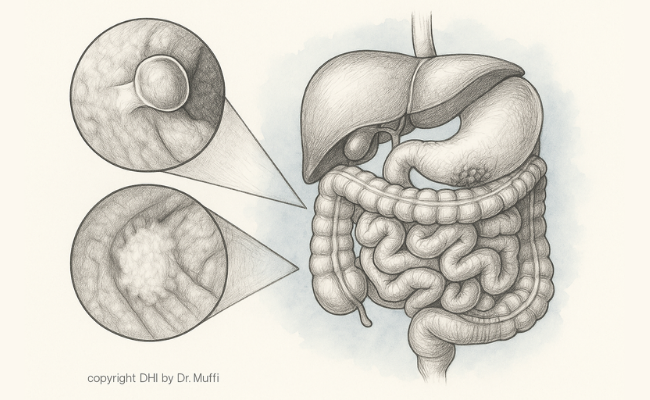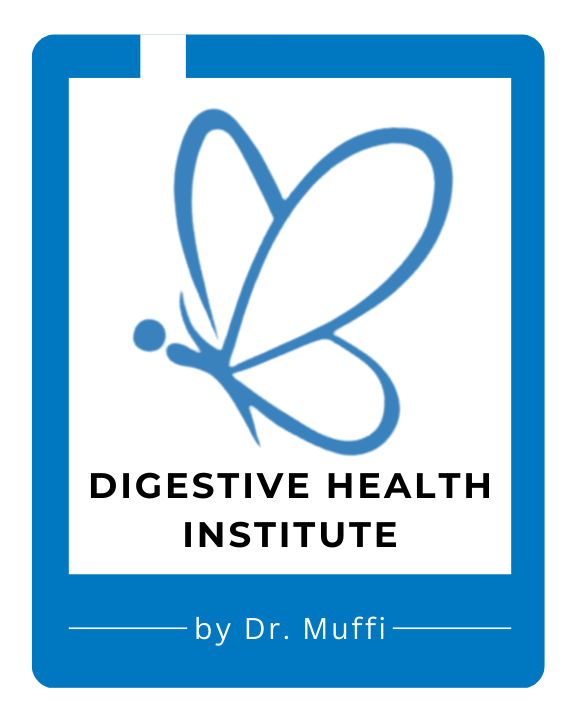Large & Small Intestine Cancer
Introduction | Advantages | Recovery

What Are Intestinal Cancers?
Intestinal cancers happen when abnormal cells grow in the small or large intestine (also known as the colon). These cancers can affect how your body digests food and absorbs nutrients.
- The small intestine connects your stomach to your large intestine and helps absorb nutrients
- The large intestine (colon and rectum) absorbs water and forms stool.
Signs & Symptoms to Watch For
Symptoms may vary, but common signs include:
- Unexplained weight loss
- Changes in bowel habits (diarrhea, constipation)
- Blood in the stool
- Constant tiredness
- Stomach pain or cramps
- Feeling full quickly or loss of appetite or reduced hunger
How Are These Cancers Treated?
Types of Surgeries We Offer:
- Segmental Resection (Small Intestine Surgery): We remove the cancerous part of the small intestine and reconnect the healthy parts.
- Colectomy (Large Intestine Surgery): This involves removing the affected part of the colon. If needed, we can also remove the entire colon
- Rectal Cancer Surgery: For cancers lower down in the intestine, we may need to remove part or all of the rectum.
- Minimally Invasive (Laparoscopic/Robotic) Surgery: When possible, we use advanced techniques that reduce pain, speed up recovery, and leave smaller scars.
- Temporary or Permanent Stoma (Colostomy/Ileostomy): In some cases, we may create a small opening in the abdomen to pass stool into a bag. This helps the intestine to heal.
What Surgeries Are Offered?
We offer advanced, patient-specific surgical options to treat cancers of the large and small intestines. These include:
- Endoscopic procedures for early lesions
- Laparoscopic surgery for minimally invasive treatment
- Robotic-assisted surgery for enhanced precision
- Segmental resections and anastomosis as required for cancer removal
Benefits of Laparoscopic Colorectal Surgery
Laparoscopic surgery involves small incisions and minimal tissue handling, offering:
- Less postoperative pain
- Shorter hospital stays
- Faster return to daily activities
Advantages of Robotic Surgery Over Laparoscopy
- Greater surgical precision and flexibility
- Smaller, more refined incisions
- Quicker recovery with less physical discomfort
Hospital Stay & Recovery Time
- Surgery Duration: Typically 1 to 3 hours
- Hospital Stay: Usually 2-3 days
- Recovery: Most patients resume normal activities such as climbing stairs, returning to work, and driving within 1 to 2 weeks
Pre-Surgery Preparation
Prior to surgery, your colon and rectum must be completely emptied. This includes:
- A liquid diet for 1–2 days
- Intake of bowel cleansing medication as advised by your surgeon
Will I Need a Stoma?
In some cases of colon or rectal cancer, a temporary or permanent stoma may be required. If so, our team will guide you through:
- The purpose of the stoma
- How it works
- Post-surgery care and support
Our surgeons ensure you’re fully informed and supported throughout the process.
Small Intestine Cancer Surgeries
- Segmental Resection (Small Bowel Resection): Removal of the cancerous section of the small intestine with a margin of healthy tissue, followed by reconnection (anastomosis).
- Whipple Procedure (Pancreaticoduodenectomy): Performed if the tumor is in the duodenum (the first part of the small intestine), especially near the pancreas.
- Laparoscopic or Robotic Resection: Minimally invasive options for eligible cases, offering quicker recovery and smaller incisions.
- Debulking Surgery: For advanced cases where complete removal isn't possible, to reduce tumor size and relieve symptoms.
Large Intestine (Colon and Rectal) Cancer Surgeries
- Colectomy (Colon Resection): Partial Colectomy involves removing the cancerous section of the colon along with nearby lymph nodes, while Total Colectomy removes the entire colon in cases of more extensive disease.
- Proctectomy: Removal of part or all of the rectum (for rectal cancer).
- Proctocolectomy with Ileostomy: Removal of both colon and rectum, often followed by the creation of a stoma (ileostomy).
- Colostomy or Ileostomy Creation: May be temporary or permanent, based on the extent and location of the cancer and resection.
- Transanal Minimally Invasive Surgery (TAMIS): For early-stage rectal cancers, done through the anus without external incisions.
- Pelvic Exenteration: For advanced rectal cancers involving nearby organs—removal of the rectum and surrounding structures.
What is large intestine cancer?
It’s cancer that starts in the colon (large bowel) or rectum, often beginning as non-cancerous growths called polyps.
What are common symptoms?
Changes in bowel habits (diarrhea/constipation), rectal bleeding, persistent abdominal discomfort, unexplained weight loss, and fatigue are common.
What is small intestine cancer?
It’s a rare cancer that forms in the small bowel, which is the long tube connecting the stomach to the large intestine.
What are common symptoms?
Symptoms can be vague but include abdominal pain, unexplained weight loss, nausea, vomiting, and bleeding in the stool.
Transform lives through
world-class bariatric care!

India’s premier obesity & digestive centre
Phone Number
+91 9820062040
+91 8356977265
enquiry@thedigestive.in
